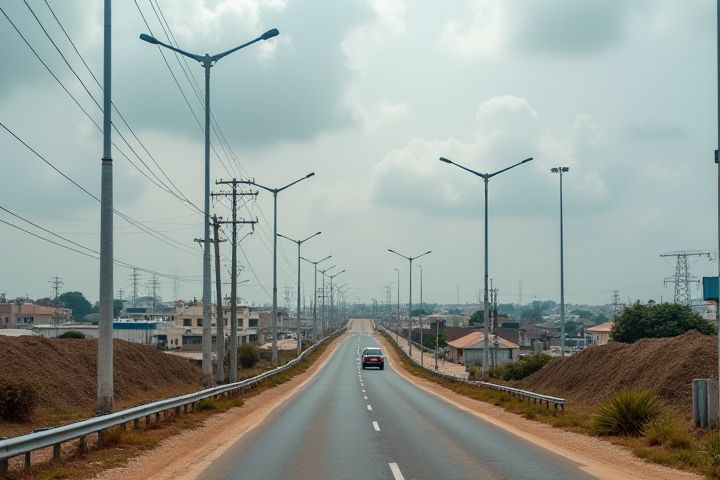
Nigeria's infrastructure landscape encompasses roads, railways, airports, and power supply, crucial for economic development. The road network, spanning over 200,000 kilometers, facilitates trade and transportation but often suffers from poor maintenance and congestion. The railway system, revitalized in recent years, connects major cities and enhances logistics, yet faces challenges in expansion and modernization. Airports, including Nnamdi Azikiwe International Airport and Murtala Muhammed International Airport, cater to increasing passenger traffic but often lack modern amenities. Power supply remains a significant hurdle, with frequent outages impacting industries and daily life, highlighting the need for investment in renewable energy sources and sustainable infrastructure solutions.
Power supply challenges
Power supply challenges in Nigeria significantly hinder economic growth and daily living standards. The country experiences frequent outages due to inadequate generation capacity, aging infrastructure, and insufficient maintenance of power plants. Urban areas face higher demands for electricity, exacerbating the issue as rural communities often rely on unreliable sources or alternative energy, such as generators. Investing in modernizing the national grid and diversifying energy sources, like renewable energy initiatives, is crucial for improving power accessibility and reliability throughout Nigeria.
Poor road network
Nigeria's infrastructure development is significantly hindered by its poor road network, characterized by inadequate maintenance and insufficient coverage. Major transportation routes, especially in rural areas, struggle with potholes and congestion, impacting trade and mobility. The government has undertaken various initiatives to enhance road quality, yet funding and corruption problems impede progress. Investing in road infrastructure not only boosts the economy but also improves access to essential services for communities across the nation.
Railway system development
The railway system development in Nigeria is undergoing significant transformation, aimed at enhancing connectivity and boosting economic growth. Major projects include the Lagos-Ibadan and Abuja-Kaduna rail lines, which facilitate efficient movement of goods and passengers across key regions. Investments from both the government and private sectors have been directed towards upgrading existing tracks and expanding the network, ensuring improved safety and reliability. By prioritizing railway infrastructure, Nigeria seeks to alleviate road congestion and reduce transportation costs, ultimately fostering regional trade and development.
Internet connectivity issues
In Nigeria, the infrastructure surrounding Internet connectivity faces significant challenges, including inadequate broadband access and high operational costs. The limited presence of fiber-optic networks in rural areas contributes to a digital divide, impacting educational and economic opportunities. Efforts to improve connectivity are underway, with government initiatives promoting the expansion of telecommunications infrastructure. As a user, accessing reliable Internet can greatly influence your ability to participate in the digital economy and access essential services.
Port congestion
Port congestion in Nigeria significantly impedes trade efficiency and economic growth. Major ports, such as Apapa and Tin Can Island in Lagos, face overwhelming traffic due to inadequate infrastructure and poor transportation networks. This congestion leads to increased shipping costs, delays in cargo delivery, and a negative impact on supply chains. Addressing these challenges requires investment in modernizing port facilities, enhancing road and rail connectivity, and implementing effective management systems to streamline operations.
Water supply concerns
Nigeria faces significant challenges in water supply infrastructure, with millions lacking access to safe drinking water. The country's urban areas experience increased demand due to rapid population growth, leading to insufficient distribution systems and frequent outages. Rural communities often rely on hand-dug wells and rivers, exposing residents to contamination risks. Investment in sustainable water management technologies and improved sanitation practices is crucial for addressing both immediate and long-term water supply concerns.
Housing shortages
Nigeria faces a significant housing shortage, with over 17 million units needed to accommodate its rapidly growing population. Urbanization accelerates this crisis, particularly in cities like Lagos and Abuja, where demand for affordable housing outpaces supply. Government initiatives and public-private partnerships aim to address these challenges by promoting sustainable construction practices and increasing investment in infrastructure development. You can explore various housing schemes that provide financial assistance and support for low-income families, helping to alleviate the ongoing housing deficit.
Frequent traffic congestion
Nigeria's infrastructure challenges are prominently illustrated by frequent traffic congestion, particularly in urban centers like Lagos and Abuja. These congestion issues stem from inadequate road networks, a rising number of vehicles, and insufficient public transportation options, leading to significant delays and economic losses. Innovative solutions such as improved traffic management systems, investments in mass transit, and better road maintenance are crucial to alleviating this problem. As a result, addressing these infrastructural deficits not only enhances mobility but also fosters sustainable economic growth and urban development in your communities.
Underdeveloped public transport
Nigeria's public transport infrastructure is notably underdeveloped, resulting in significant challenges for urban mobility and economic growth. Major cities like Lagos and Abuja experience chronic traffic congestion, exacerbated by inadequate road networks and insufficient mass transit systems. You may find that overcrowded buses, lacking rail options, and poorly maintained roads contribute to daily commutes that can exceed several hours. Investment in sustainable transportation solutions and improved infrastructure is essential for enhancing accessibility and overall quality of life for Nigerian citizens.
Rural infrastructure gap
Nigeria's rural infrastructure gap presents significant challenges to economic development and social cohesion. Limited access to reliable roads, electricity, and clean water hinders agricultural productivity and educational opportunities in rural areas. Investment in sustainable infrastructure projects is crucial for enhancing the quality of life and reducing urban migration. By prioritizing transportation networks and utility services, the Nigerian government can empower rural communities and foster sustainable growth.
